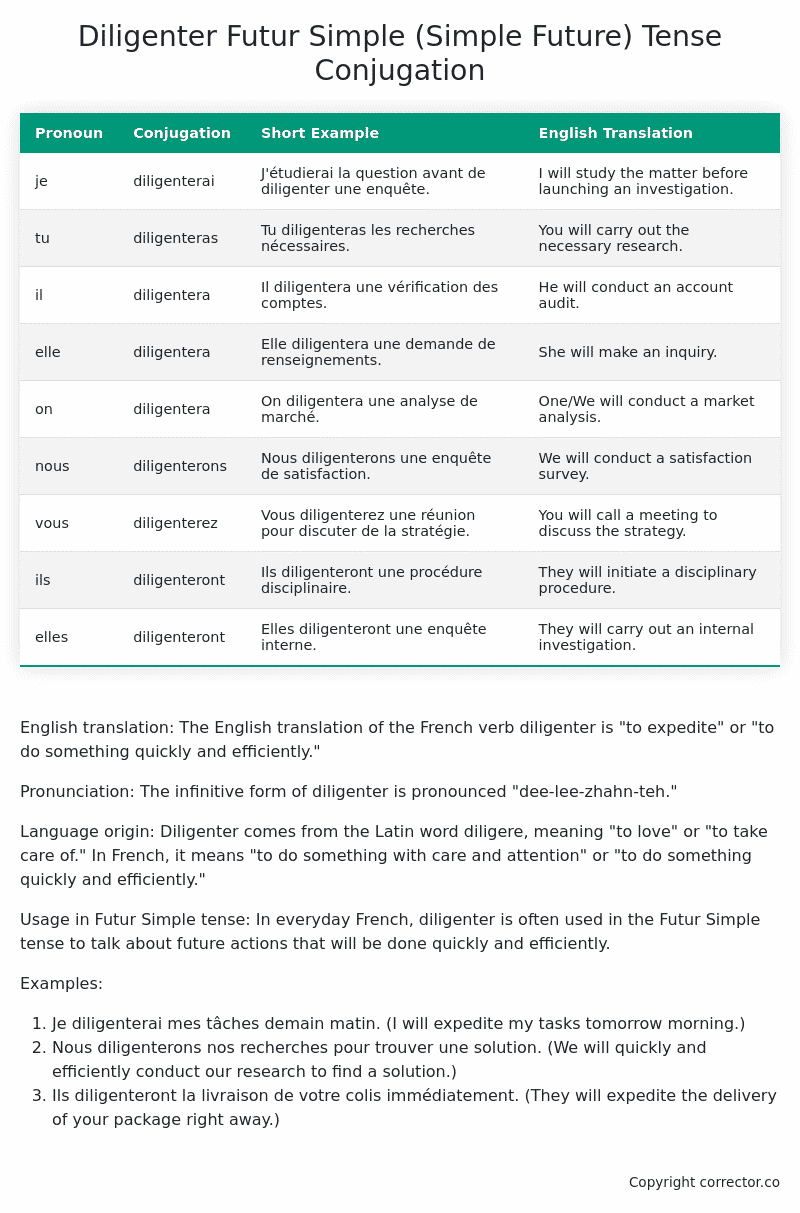Futur Simple (Simple Future) Tense Conjugation of the French Verb diligenter
Introduction to the verb diligenter
English translation: The English translation of the French verb diligenter is “to expedite” or “to do something quickly and efficiently.”
Pronunciation: The infinitive form of diligenter is pronounced “dee-lee-zhahn-teh.”
Language origin: Diligenter comes from the Latin word diligere, meaning “to love” or “to take care of.” In French, it means “to do something with care and attention” or “to do something quickly and efficiently.”
Usage in Futur Simple tense: In everyday French, diligenter is often used in the Futur Simple tense to talk about future actions that will be done quickly and efficiently.
Examples:
- Je diligenterai mes tâches demain matin. (I will expedite my tasks tomorrow morning.)
- Nous diligenterons nos recherches pour trouver une solution. (We will quickly and efficiently conduct our research to find a solution.)
- Ils diligenteront la livraison de votre colis immédiatement. (They will expedite the delivery of your package right away.)
Table of the Futur Simple (Simple Future) Tense Conjugation of diligenter
| Pronoun | Conjugation | Short Example | English Translation |
|---|---|---|---|
| je | diligenterai | J’étudierai la question avant de diligenter une enquête. | I will study the matter before launching an investigation. |
| tu | diligenteras | Tu diligenteras les recherches nécessaires. | You will carry out the necessary research. |
| il | diligentera | Il diligentera une vérification des comptes. | He will conduct an account audit. |
| elle | diligentera | Elle diligentera une demande de renseignements. | She will make an inquiry. |
| on | diligentera | On diligentera une analyse de marché. | One/We will conduct a market analysis. |
| nous | diligenterons | Nous diligenterons une enquête de satisfaction. | We will conduct a satisfaction survey. |
| vous | diligenterez | Vous diligenterez une réunion pour discuter de la stratégie. | You will call a meeting to discuss the strategy. |
| ils | diligenteront | Ils diligenteront une procédure disciplinaire. | They will initiate a disciplinary procedure. |
| elles | diligenteront | Elles diligenteront une enquête interne. | They will carry out an internal investigation. |
Other Conjugations for Diligenter.
Le Present (Present Tense) Conjugation of the French Verb diligenter
Imparfait (Imperfect) Tense Conjugation of the French Verb diligenter
Passé Simple (Simple Past) Tense Conjugation of the French Verb diligenter
Passé Composé (Present Perfect) Tense Conjugation of the French Verb diligenter
Futur Simple (Simple Future) Tense Conjugation of the French Verb diligenter (this article)
Futur Proche (Near Future) Tense Conjugation of the French Verb diligenter
Plus-que-parfait (Pluperfect) Tense Conjugation of the French Verb diligenter
Passé Antérieur (Past Anterior) Tense Conjugation of the French Verb diligenter
Futur Antérieur (Future Anterior) Tense Conjugation of the French Verb diligenter
Subjonctif Présent (Subjunctive Present) Tense Conjugation of the French Verb diligenter
Subjonctif Passé (Subjunctive Past) Tense Conjugation of the French Verb diligenter
Subjonctif Imparfait (Subjunctive Imperfect) Tense Conjugation of the French Verb diligenter
Subjonctif Plus-que-parfait (Subjunctive Pluperfect) Tense Conjugation of the French Verb diligenter
Conditionnel Présent (Conditional Present) Tense Conjugation of the French Verb diligenter
Conditionnel Passé (Conditional Past) Tense Conjugation of the French Verb diligenter
L’impératif Présent (Imperative Present) Tense Conjugation of the French Verb diligenter
L’infinitif Présent (Infinitive Present) Tense Conjugation of the French Verb diligenter
Struggling with French verbs or the language in general? Why not use our free French Grammar Checker – no registration required!
Get a FREE Download Study Sheet of this Conjugation 🔥
Simply right click the image below, click “save image” and get your free reference for the diligenter Futur Simple tense conjugation!

Diligenter – About the French Futur Simple (Simple Future) Tense
Formation of Futur Simple
For regular -er verbs (e.g., parler – to speak)
For regular -ir verbs (e.g., finir – to finish)
For regular -re verbs (e.g., vendre – to sell)
Common Everyday Usage Patterns
Conditional Statements
Interactions with Other Tenses
Futur Antérieur
Conditional
Present
Summary
I hope you enjoyed this article on the verb diligenter. Still in a learning mood? Check out another TOTALLY random French verb conjugation!


